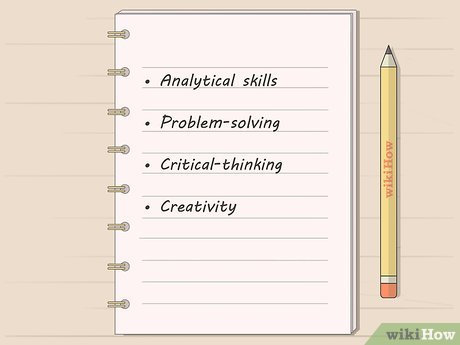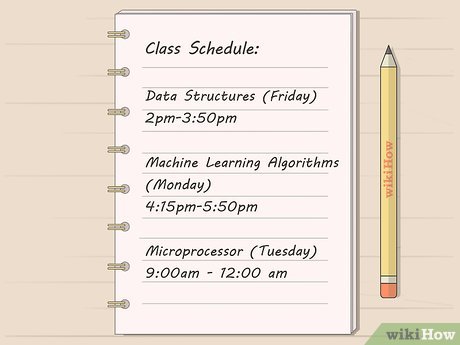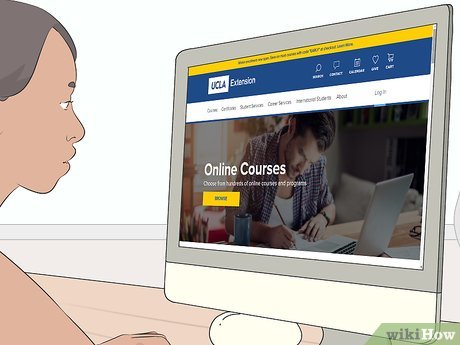How to Choose University Courses
Method 1 of 2:
Exploring Your Course Options
-
 Discover what you are passionate about. A course will be much easier to complete if you love what you are working on. Not everyone can make a living out of what they like to do, but the course you choose should at least be enjoyable. Think about what you like to do and what you enjoy talking to others about.[1]
Discover what you are passionate about. A course will be much easier to complete if you love what you are working on. Not everyone can make a living out of what they like to do, but the course you choose should at least be enjoyable. Think about what you like to do and what you enjoy talking to others about.[1]- If you love animals, a course that will allow you to obtain a degree in veterinary medicine might be a good fit for you. Alternatively, if you enjoy building and are good at math, an architecture course might suit you best.
-
 Examine what your skills are. Often, the thing that you are most interested in is the thing that you are really good at. You may excel in math class or be great with design. If you've been complimented on a specific area of your life in the past, you may want to choose a course that lines up with those skills.[2]
Examine what your skills are. Often, the thing that you are most interested in is the thing that you are really good at. You may excel in math class or be great with design. If you've been complimented on a specific area of your life in the past, you may want to choose a course that lines up with those skills.[2]- If people often compliment you on your computer skills, you might look into a computer science course. Or, if you are good at writing, an English degree might be for you.
-
 Find out more about your professors. Usually, you can access the main professors who teach classes in your course online. Try searching your potential professors' names online and seeing what they have published and if they have any student reviews.[3]
Find out more about your professors. Usually, you can access the main professors who teach classes in your course online. Try searching your potential professors' names online and seeing what they have published and if they have any student reviews.[3]- If you are interested in business, check out which professors usually teach business management classes. If you want to sign up for a liberal arts course, research the people who would teach you art history or philosophy.
-
 Speak to an advisor before you sign up. Certain courses usually have advisors specific to their course. Talk to an advisor and ask any questions that you may have about your course. You can also find out if your course will be enjoyable for you.[4]
Speak to an advisor before you sign up. Certain courses usually have advisors specific to their course. Talk to an advisor and ask any questions that you may have about your course. You can also find out if your course will be enjoyable for you.[4]- For example, try asking, 'How is the workload for this course?'
- 'What do students like the most about this course?'
- 'Do you think this course would align with my future goals?'
-
 Consider what career opportunities you would like after graduation. Choose a course that will provide you with many job opportunities in the future. You are picking a course that you'll have fun taking, but also one that will help you reach your goals. Consider what kind of career opportunities your course will provide and if those align with your future.[5]
Consider what career opportunities you would like after graduation. Choose a course that will provide you with many job opportunities in the future. You are picking a course that you'll have fun taking, but also one that will help you reach your goals. Consider what kind of career opportunities your course will provide and if those align with your future.[5]- If your goal is to become a professional actor, a visual arts course may help you attain that. Or, if you want to become a doctor, a pre-med course would probably suit your needs.
- It tries to make a preliminary selection of schools and universities that reflect data related to access requirements, what type of students the program is aimed at, the number of hours covered by the program, the subjects taught, the methodology, career opportunities, whether they have scholarship programs, recognition of degrees as well as university credits. It is also important to seek opinions from alumni and the market trend for that degree.
Tip: Science, Technology, Engineering, and Mathematics courses often have the highest rate of employment after graduation.
Method 2 of 2:
Choosing Your Class Schedule
-
 Speak to your advisor about what classes you need. It can be tough to decipher what classes you are going to have to take to graduate. Talk to an advisor for your course to determine which classes you should take and when they are offered.[6]
Speak to your advisor about what classes you need. It can be tough to decipher what classes you are going to have to take to graduate. Talk to an advisor for your course to determine which classes you should take and when they are offered.[6]- Some classes are only offered at certain times of the year, while others require specific prerequisites before you can sign up for them.
-
 Take 1 to 2 electives along with your required classes. You may have a long list of classes you need to graduate, but try to work in a couple of elective classes that sound interesting. Choose courses that will push you out of your comfort zone or teach you a new skill. Electives will give you something else to focus on besides your main degree, and they can be a good stress reliever.[7]
Take 1 to 2 electives along with your required classes. You may have a long list of classes you need to graduate, but try to work in a couple of elective classes that sound interesting. Choose courses that will push you out of your comfort zone or teach you a new skill. Electives will give you something else to focus on besides your main degree, and they can be a good stress reliever.[7]- If you are getting a science degree, try taking a pottery or art class as an elective. Or, if you are doing a graphic design course, choose an environmental field class to switch it up.
-
 Take a variety of classes if you aren't sure which course to sign up for. Choosing a specific path can be difficult, and many people leave their course undeclared until the second or third year of college. If you are trying to figure out what course you'd like to take, sign up for many different classes to get a feel for what you might like to do.[8]
Take a variety of classes if you aren't sure which course to sign up for. Choosing a specific path can be difficult, and many people leave their course undeclared until the second or third year of college. If you are trying to figure out what course you'd like to take, sign up for many different classes to get a feel for what you might like to do.[8]- If you think you might be interested in science, take a few biology classes to see if you like them. If you are considering a mathematics career, sign up for some high-level math to try them out.
-
 Determine if you'd like to go to school full-time or part-time. Some courses only require their students to take classes on a part-time schedule, while others can only be finished in a timely manner by taking classes full-time. If you have other responsibilities, like children or work, you may want to look into a course that allows part-time participation.[9]
Determine if you'd like to go to school full-time or part-time. Some courses only require their students to take classes on a part-time schedule, while others can only be finished in a timely manner by taking classes full-time. If you have other responsibilities, like children or work, you may want to look into a course that allows part-time participation.[9]- Full-time programs may allow you to finish your course faster, but they will have a larger work-load.
-
 Choose class times that you know you will attend. It's easy to pick a 9 AM class on a Friday because it fits your schedule, but will you really want to roll out of bed that early every Friday for a whole term or semester? Try to choose classes that you won't skip often.[10]
Choose class times that you know you will attend. It's easy to pick a 9 AM class on a Friday because it fits your schedule, but will you really want to roll out of bed that early every Friday for a whole term or semester? Try to choose classes that you won't skip often.[10]- For example, if you're a night owl, pick classes that start in the afternoon. Or if you love getting up early to workout, try choosing classes that start in the morning.
-
 Give yourself time to move between classes. It might seem like 10 minutes in between each class is enough, but if you have to walk all the way across campus to get to your next class, you might not make it on time. Look at a map of your university to see how far away the buildings are and if it's realistic to sign up for classes so close together in time.[11]
Give yourself time to move between classes. It might seem like 10 minutes in between each class is enough, but if you have to walk all the way across campus to get to your next class, you might not make it on time. Look at a map of your university to see how far away the buildings are and if it's realistic to sign up for classes so close together in time.[11]- Some universities may even have classes that meet off campus. Read the description of your class carefully.
-
 Choose online classes if you don't want to commute to class. Online classes can be helpful if you live off campus and have to drive or take public transportation to class. However, you will have to be very self-motivated to do your online work and keep yourself on track. Sign up for classes online if you can encourage yourself to keep up with the work-load.[12]
Choose online classes if you don't want to commute to class. Online classes can be helpful if you live off campus and have to drive or take public transportation to class. However, you will have to be very self-motivated to do your online work and keep yourself on track. Sign up for classes online if you can encourage yourself to keep up with the work-load.[12] -
 Sign up for classes as soon as you can. There are a limited amount of spots in any given class, and they often fill up quickly. Sign up for your classes as soon as you are able to. Most universities allow you to sign up online at an appointed time.[13]
Sign up for classes as soon as you can. There are a limited amount of spots in any given class, and they often fill up quickly. Sign up for your classes as soon as you are able to. Most universities allow you to sign up online at an appointed time.[13]Tip: The longer you have been in college, the earlier you will get to sign up for classes.
Share by
Jessica Tanner
Update 24 March 2020












